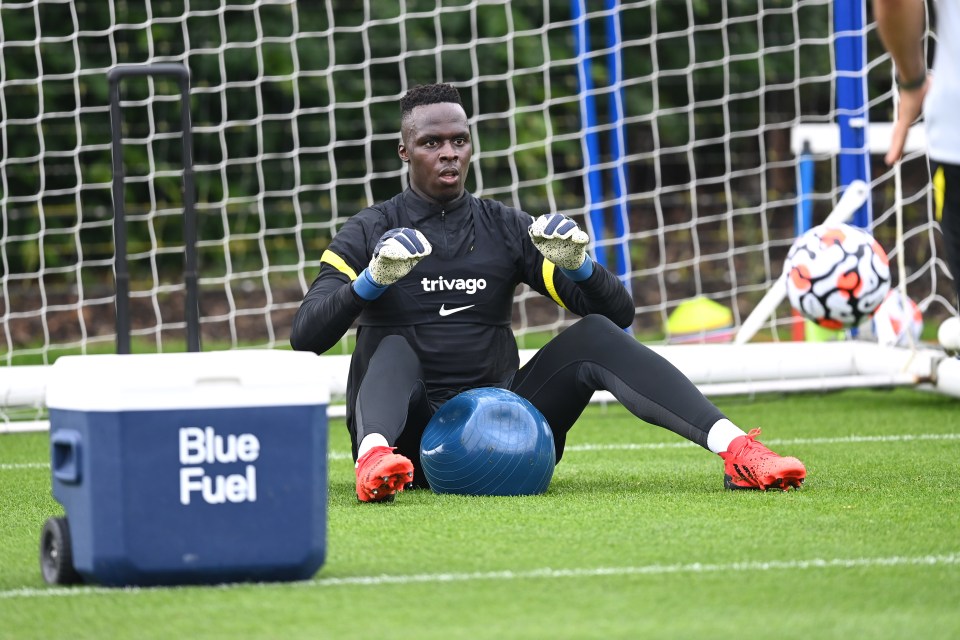Chelsea Digital Ventures: The tech business spun out of a football club

Look closely next time Romelu Lukaku or Pernille Harder takes a mid-match drink and you may notice something that marks Chelsea out from other football clubs.
Because instead of taking a swig from a bottle of Lucozade, or another well known sports hydration brand, players at the west London club have their own in-house product.
Blue Fuel comprises not just drinks but also protein bars, energy gummies and accompanying app and is used by Chelsea’s men’s and women’s first teams as part of their daily regimen.
But while it was developed by the club’s nutritionists, they are not keeping it to themselves; the Blue Fuel range is available for purchase by other elite sports teams and amateurs alike.
It is one of a handful of offerings launched by Chelsea Digital Ventures, a consumer-focused business set up in 2018 and spun out of the football club.
Chelsea Digital Ventures is tasked with leveraging the club’s know-how and intellectual property to create products with appeal beyond the team’s fanbase.
Blue Fuel is the most prominent, but it has also launched two apps: C-Score, which measures general health, and Perfect Play, offering personalised football coaching tips.
“We’ve got a lot of expertise within the club, spanning health, fitness and nutrition as well as user engagement and the media side,” said Chelsea Digital Ventures director David Rose.
“So the thinking was, rather than always responding to incoming pitches, application of third-party technology or ideas, could we start from that expertise we have and conceive products and services that we thought would have value to people?”
Chelsea Digital Ventures wholly owns Blue Fuel and its other brands, more of which are “in the pipeline” and could be announced early next year, when a refresh of Perfect Play is also due, says Rose.
It has also lodged trademark applications for two more products: Footwork, which covers smart gym and training gear, and fitness classes under the brand Duofit.
“They have to be authentic,” said Rose. “They’ve got to build on expertise that we think is truthful and that we can claim to be leaders within sport. And then a lot of it is about the size of the opportunity.”

Blue Fuel’s branding is an attempt to balance hinting at its Chelsea-specific roots while also appealing to a demographic that doesn’t follow the club or even football, Rose says.
“We conducted lots of market research… exploring whether we felt a product from Chelsea would be negative to fans of other clubs,” he added.
“And of course there are a small number of people who say ‘I’ll never buy anything associated with the club’. But we find they’re a very small portion.
“Most people will make a decision based on what they believe is the best product and how it’s suited to them. And the further we go from the UK, even that small percentage falls away.”
How are Chelsea and Chelsea Digital Ventures linked?
Like Chelsea FC, Chelsea Digital Ventures is wholly owned by Roman Abramovich. Which begs the question: why separate the businesses?
“The fundamental rationale is one of the flexibility that a start-up allows,” said Rose. “Being quick, agile, not constrained by the larger organisation means we have flexibility in terms of commercial relationships.
“Clearly we’ll always be absolutely respectful of club partners but we can operate with the flexibility that any typical product start-up would like.”
Chelsea Digital Ventures pays fees to Chelsea FC, though Rose won’t say how much and it is not clear from the company’s accounts.
“Our relationship with the football club is a normal commercial relationship, as the club would have with a typical partner. What remains unique is the access we have to that expertise,” he said.
The club, then, receives money from Chelsea Digital Ventures without bearing any of its losses, which amounted to £3m in 2019 and almost £15m in 2020, according to filings.
On the other hand, the arrangement may prevent the club striking other commercial deals: the use of Blue Fuel, for example, means it cannot sign other nutrition or hydration partners on an exclusive basis.
So-called related party transactions, meanwhile, are set to come in for greater scrutiny from the Premier League in the wake of the Saudi-led takeover of Newcastle United.
If deemed as such, Chelsea could have to demonstrate any fees it receives from Chelsea Digital Ventures were at fair market value.

On the losses, Rose points to the difficulties of launching new products during a pandemic, when Blue Fuel take-up in particular was hindered by the shutting down of sport.
He adds: “There was never any misunderstanding that this would be something that immediately saw a profitable business but we do believe that in a relatively short time-frame, a small number of years, we can grow these to be meaningful businesses.”
In recent months, Blue Fuel has won some significant customers, including elite teams from football, rugby, cricket and other sports. Chelsea Digital Ventures won’t name them but Rose says they are all paying clients who buy products from the range directly.
“It plays really well into what we’re trying to in terms of not being perceived as just a football product,” he said.
“I’d still rather roll that out in that slightly underground way to ensure we’re out there and not just buying our way through various corporate affiliations.
“That’s probably been the main thing for us, ensuring that the Blue Fuel growth continues for us, which it has done really well.”
For more information, visit www.bluefuel.com/
